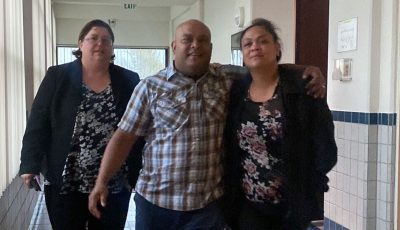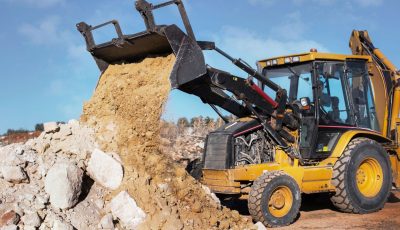Bill to clip DPL wings heads to floor
A bill to limit the authority of the Department of Public Lands now heads to the House floor for a vote, with lawmakers on both sides of the aisle growing frustrated with a slow going homestead program, an alleged underreporting of lease funds, and perceived inconsistencies in land lease policy.
Lawmakers have been informed by counsel that DPL has been treated as a constitutional entity and not the statutory entity that it is under Public Law 15-2. In this light, DPL obtains powers under the Constitution to manage and dispose of public lands, implement a homestead program, and use proceeds from public lands for its operations, the rest of which would go to the Marianas Public Lands Trust.
But everything else can be modified. These include the years or terms of a lease, the authority to renegotiate leases before a term expires, or the amount of oversight lawmakers can have in decisions made by DPL, for example.
Members of the House Committee on Natural Resources agreed to back House Bill 19-79 for approval and passage in their next House session.
The bill claims that DPL has been inconsistent at best with its commercial land leases, and that thousands have been waiting for homestead applications to be processed while large portions of land are being leased expeditiously for commercial use.
Requests for comment sent to DPL this week were not responded to as of press time yesterday.
Commonwealth-wide, there are 3,182 homestead applicants as of May 2015, Saipan Tribune learned yesterday.
“DPL has unilaterally decided not to enforce laws,” House bill 19-70, authored by Rep. Roman Benavente, states. “Attempts at legislative oversight have been unsuccessful. We cannot sit back and watch DPL continue to mismanage the CNMI’s most vital resource, its public lands.”
The bill, among others, makes these changes to the Commonwealth Code:
From 25 years, DPL cannot transfer leaseholds interests in public lands that exceed five years. It adds that leases in excess of five years shall be subject to the legislative approval of three-fourths of the Legislature in a joint session.
The bill says DPL “shall not” transfer an interest in more than one hectare of public land without the approval of three-fourths of the Legislature in a joint session. Originally, the department had say over lands less than five hectares. Lawmakers struck out “five” to put in “one,” and adds this change to similar parts of the law.
DPL shall not transfer a leasehold interest in public lands that exceed five years, including renewal rights. Currently, DPL may not transfer land that exceeds 25 years.
Lease revenues
The alleged underreporting of lease revenues was also discussed yesterday afternoon.
In past meetings between DPL Secretary Pete A. Tenorio and lawmakers, Tenorio had openly disclosed the existence of time certificate deposits, whose monies amount in the “millions” and should have, according to lawmakers, gone straight to the Marianas Public Lands Trust, Saipan Tribune learned.
It was discovered by past legislatures around 2009 or 2010 that separate $6 million and $8 million TCD accounts have been set up with the Bank of Saipan by DPL, Saipan Tribune learned.
During the committee meeting yesterday, chair Rep. Edwin Aldan asked their counsel if DPL was authorized to put money in banks. The answer to this was no, as they could only use lease revenues for operations.
Rep. Joseph Leepan Guerrero said Tenorio was “sitting on a pot of gold” that should be remitted.
House counsel John Cool said the accounts have been set up before legislative oversight. He advised that DPL be required during the next budget cycle to start complying with the law and the Planning and Budgeting Act.
In an interview, Aldan said putting money in banks before reporting these revenues to the Legislature was “not proper.”
“…If this is outside what we have allotted for in their budget, then we have a problem because I don’t think they are supposed to be putting money in the bank. That’s the job of [the Marianas Public Lands Trust], to invest this money for [the Northern Marianas descent].
“That’s the way all this money from public land leases is supposed to be properly funneled. Through the proper agencies like MPLT,” Aldan added.
Homestead programs
Lawmakers are also frustrated with the slow going homestead program that DPL is charged with implementing.
During the committee meeting yesterday, Rep. Angel Demapan dismissed notions that DPL did not have the funding for these lots. He noted the decades-old moratorium on the program that keeps back thousands from homestead opportunities.
Demapan said the CNMI can’t keep putting these people on a wait list until they pass away. That would be “ridiculous.”
He said if they could not go forward with the program, they should tell the people so, and start looking at high-rise construction opportunities.
“We want some kind of finality to the issue of homestead. The land, the money is there,” he said.
Of the 3,182 homestead applicants CNMI-wide, Aldan said there are about 700 applicants on Tinian.
Aldan is concerned that costs to build have more than doubled since 20 years ago.
“We ask that they do their administrative work. Do it properly,” Aldan said of DPL.
“People have passed away without getting their homestead. If there is a moratorium, lift the moratorium. If we need to revamp the Homestead Act—let us [do that] now.
“If we continue to cater to developers because that parcel of land the government owns is open, how about the homesteaders? People have been waiting for their homestead, and DPL has been turning a blind eye,” he said.



























